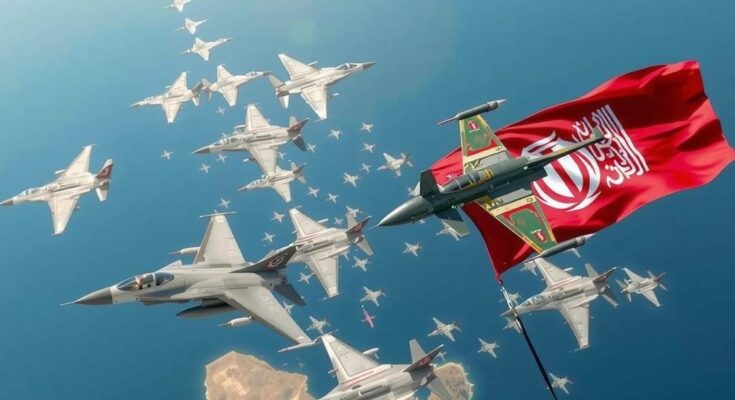Iran and Saudi Arabia are reportedly planning joint military exercises in the Red Sea, as reported by Iranian media. This would be the first such collaboration between the two nations, which resumed diplomatic relations in 2022 after years of rivalry and conflict. While details remain unconfirmed by Saudi Arabia, the discussions occur amid increased Huthi rebel attacks on maritime targets, illustrating ongoing regional complexities.
Iran and Saudi Arabia have reportedly embarked on plans to conduct joint military exercises in the Red Sea, as indicated by a recent Iranian news report. This development marks a significant shift between the two regional powers, which have historically been rivals, often supporting opposing factions in various conflicts within the Middle East. Diplomatic relations were severed in 2016 but were renewed last year following a surprising reconciliation brokered by China. Admiral Shahram Irani, the commander of the Iranian navy, stated, “Saudi Arabia has asked that we organise joint exercises in the Red Sea,” as reported by the Iranian news agency ISNA. He further mentioned that preparations are in progress and that delegations from both nations will engage in consultations regarding the implementation of the exercises. Specific details and timelines for these exercises have yet to be disclosed. Despite these assertions, Saudi Arabia has not confirmed its participation in joint military maneuvers with Iran. The backdrop of these discussions includes ongoing tensions in the region, particularly the recent campaign of attacks by Yemen’s Huthi rebels, who are supported by Iran. These rebels have targeted ships in the Red Sea and the Gulf of Aden, asserting that their actions are motivated by solidarity with Palestinians amidst the ongoing Israel-Hamas conflict. Since the civil unrest in Yemen began in 2015, the Huthis have been engaged in a conflict against a Saudi-led coalition, following their takeover of the capital, Sanaa. As the situation in Yemen persists, Saudi Arabia finds itself in a challenging position, aiming to disengage from the long-standing conflict while supporting the internationally recognized Yemeni government based in Aden. Notably, Saudi Arabia has opted not to be part of a U.S.-led naval coalition designed to counter Huthi aggression, further complicating its role in regional security efforts.
The rekindling of relations between Iran and Saudi Arabia represents a pivotal moment in Middle Eastern geopolitics, particularly given their previous entrenchment in opposing roles in various regional conflicts. The longstanding rivalry has often played out in proxy wars, significantly impacting conflict zones like Iraq, Syria, and Yemen. The recent endeavors for military cooperation signal a shift that may influence future diplomatic and security dynamics within the region. The alleged joint exercises come amid heightened maritime tensions, primarily driven by the activities of the Huthi rebels in Yemen, who have increasingly posed threats to maritime security in critical waterways. Understanding these interrelated issues is vital for grasping the broader implications of Iranian-Saudi cooperation.
In summary, the proposed joint military exercises between Iran and Saudi Arabia in the Red Sea represent a noteworthy development in the evolving diplomatic relationship between the two nations. While the details remain unconfirmed by Saudi Arabia, the willingness to engage in military cooperation could signify a new chapter in regional relations, particularly amidst ongoing conflicts like that in Yemen. The backdrop of Huthi attacks and broader tensions in the Middle East underscores the complex reality both nations face as they navigate their security and diplomatic policies.
Original Source: www.barrons.com




